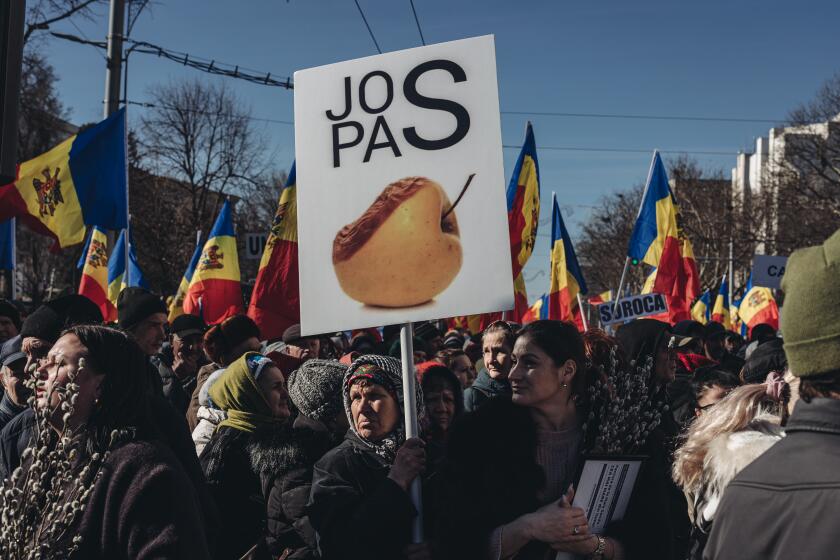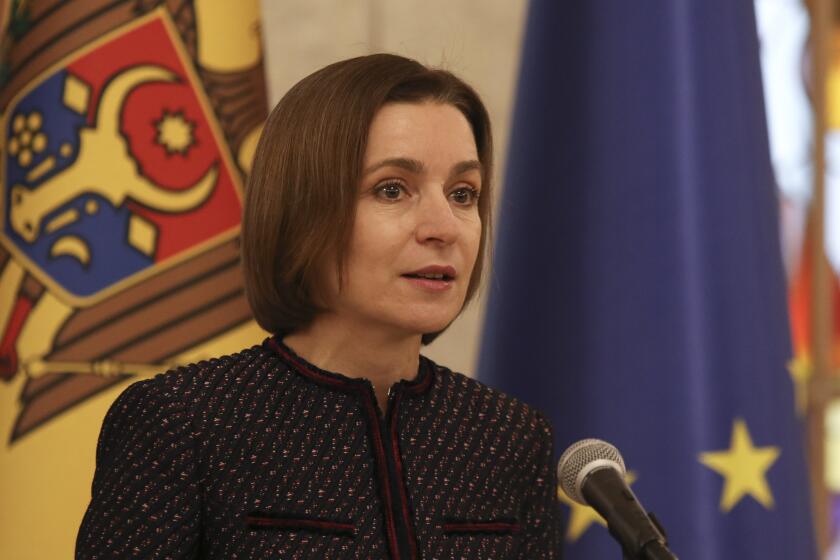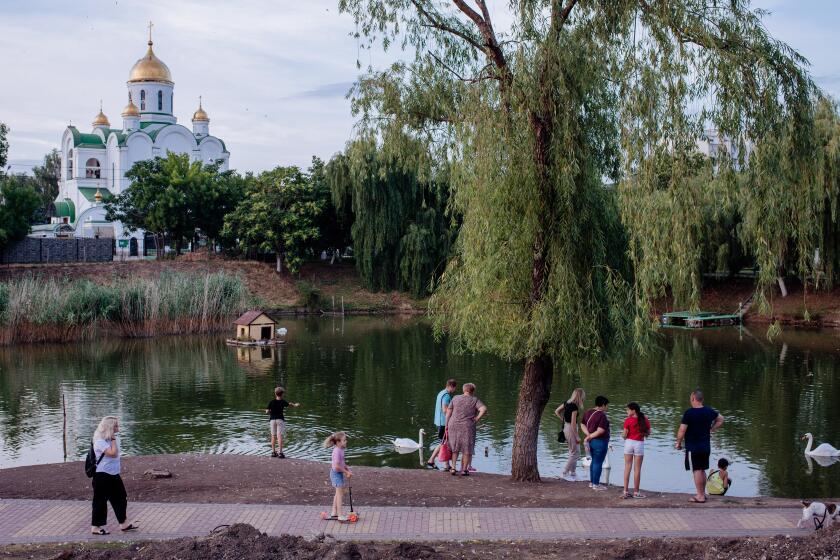The capital of Mozambique, Maputo, was brought to a standstill by strikes and protests on Monday, before police dispersed demonstrators using tear gas. Caught up in the violence was opposition leader Venancio Mondlane.
Opposition leader Venancio Mondlane (right) was speaking to journalists when police fired tear gas
Image: ALFREDO ZUNIGA/AFP
Police in Mozambique fired tear gas at the country's opposition leader and his supporters on the streets of the capital Maputo on Monday.
Venancio Mondlane, the main challenger to the ruling Frelimo party in the recent presidential election, was speaking to journalists close to the spot where his lawyer and a senior opposition party official were killed by unidentified gunmen on Friday night.
Video footage posted to Mondlane's Facebook page shows tear gas canisters being fired as Mondlane, aides, supporters and reporters run for cover.
At least one journalist was injured, according to local media, while several others, including those from DW, inhaled the gas.
Additional footage seen by DW shows at least one protester left limping with a bloodied leg after being struck by a projectile.
Police in Mozambique fired tear gas at the country's opposition leader and his supporters on the streets of the capital Maputo on Monday.
Venancio Mondlane, the main challenger to the ruling Frelimo party in the recent presidential election, was speaking to journalists close to the spot where his lawyer and a senior opposition party official were killed by unidentified gunmen on Friday night.
Video footage posted to Mondlane's Facebook page shows tear gas canisters being fired as Mondlane, aides, supporters and reporters run for cover.
At least one journalist was injured, according to local media, while several others, including those from DW, inhaled the gas.
Additional footage seen by DW shows at least one protester left limping with a bloodied leg after being struck by a projectile.
Rising tensions in Mozambique
Tensions have been soaring in Mozambique since elections on October 9.
Results aren't expected until later this week, but preliminary results suggest that Frelimo (the Front for the Liberation of Mozambique) is set to extend its 49-year rule which dates back to the southeastern African country's independence from Portugal in 1975.
Opposition parties have denounced the elections as fraudulent, with Mondlane calling for people to stay away from work and protest on Monday.
Mondlane, who ran as an independent candidate but was backed by the new Podemos opposition party, told reporters that police had tried to prevent him from leaving his own house to join the protest.
"The whole of last night, police cars were at my doorstep," he said. "I was trying to find other ways to leave the house without being noticed. I did. I won't say how."
On Monday morning, the national strike had brought Maputo and other major cities to a standstill with shops closed and streets deserted as a helicopter circled overhead.
Clashes between protesters and police began around 7:30 a.m. when security forces began to disperse groups preparing to take part in the peaceful marches.
After police fired tear gas and gunshots into the air, protesters responded by throwing rocks and pyrotechnics and shouting slogans such as "Save Mozambique" and "This country is ours."
International community condemns violence
Activists and reporters have complained in the past that Mozambique's security forces have violently clamped down on dissent, broken up peaceful protests and disrupted media work, while Frelimo has often been accused of rigging elections, which it denies.
The African Union, European Union and United Nations have condemned Friday's killing of the two opposition figures and called on the authorities to identify the perpetrators.
The head of the African Union Commission, Moussa Faki Mahamat, said he had "deep concern" over "reported cases of post-election violence and in particular the recent killings."
The European Union, which sent a team of election observers, called for an immediate investigation into the killings "that will bring to justice those responsible for this outrageous crime."
UN Secretary-General Antonio Guterres called on "all Mozambicans, including political leaders and their supporters, to remain calm, exercise restraint and reject all forms of violence."
mf/wd (AFP, AP, DW)
Mozambique police and protesters clash following political assassinations
Oct. 21, 2024 / UPI

Members of Mozambican police walk as they disperse people gathering to take part in the peaceful marches called by presidential candidate Venâncio Mondlane to repudiate the assassination of two members of his party, in Maputo, Mozambique, on October, 21, 2024. Photo by Luisa Nhantumbo/EPA-EF
Oct. 21 (UPI) -- Police and protesters clashed in the Mozambican capital of Maputo on Monday, resulting in the death of at least one demonstrator, as the southern African nation continues to reel from a pair of political assassinations over the weekend.
Mozambique has been rocked by protests since Oct. 12 when partial results from the country's general elections held three days earlier on Oct. 9, showed Daniel Chapo, the candidate for the long-ruling Frelimo Party, in the lead.
The contest has been marred by irregularities, and opposition presidential candidate Venâncio Mondlane, who was projected to finish second, has claimed victory and called for a national strike for Monday in response to the results.
But that strike turned into a march after Mondlane's lawyer, Elvino Dias, and a representative of his Podemos party, Paulo Guambe, were assassinated in the early hours of Saturday.
Gunmen had opened fire on them while in a vehicle and were killed, according to the Mozambique Center for Democracy and Human Rights, which said 25 bullets were unloaded. A third occupant in the vehicle was also shot but survived.
Protests against their killings on Monday quickly turned violent.
The Mozambique chapter of the Center and Democracy for Human Rights said Monday that a protester was killed in the Bascula Zone of Matundo when police opened fire on demonstrators.
The center also reported police also fired tear gas canisters at journalists and opposition presidential candidate Venâncio Mondlane in the capital, and that two journalists, a security guard for the independent politician and two others suffered gunshot wounds during a rally Monday morning, it said.
Video of the incident posted to Mondlane's Facebook account shows him speaking to reporters for more than 20 minutes before the firing of weapons is heard, followed by an explosion near the journalists who then flee the scene.
The Frelimo party has been the only one to the lead the country since it gained independence from Portugal in 1975. In recent years, it has increased its oppression of the opposition. The U.S. State Department's most recent country report on Mozambique highlights reports of the government committing arbitrary or lawful killings of opposition politicians.
Since the election, there have been reports of government security forces opening fire on protesters.
According to Amnesty International, two people were wounded at polling stations on Oct. 10. On Wednesday, at least one person was wounded at a rally for Mondlane when police fired at his supporter.
The United States on Monday issued a statement condemning the killings of Dias and Guambe, calling for a swift and thorough investigation.
"We urge all state institutions, political leaders, citizens and stakeholders to resolve electoral disputes peacefully and lawfully, rejecting violence and inflammatory rhetoric," State Department spokesman Matthew Miller said in a statement.
"We also call on all Mozambicans to turn to peaceful means of filing electoral grievances and reject violence and violent rhetoric. The only means to challenge results and demand accountability is through the official complaint process."
African Union Chairman H.E. Moussa Faki Mahamat also condemned the killings in a Monday statement while expressing "deep concern" over the post-election violence and recent killings.
The Sala Da Paz election watchdog expressed its concern over the violence at Monday's protest, pointing to the country's constitution that enshrines the right to demonstrate "as one of the fundamental pillars of Mozambican society."
"However, instead of ensuring the free exercise of this right, the security forces resorted to excessive use of force, including the firing of tear gas, rubber bullets, and live ammunition, reportedly to disperse protesters and journalists who were exercising their legitimate constitutional right," it said in a statement.
"This act of repression not only seriously violates the civil and political rights of citizens but also further undermines society's trust in public security institutions, whose duty should be to protect and defend democratic freedoms."
Oct. 21, 2024 / UPI

Members of Mozambican police walk as they disperse people gathering to take part in the peaceful marches called by presidential candidate Venâncio Mondlane to repudiate the assassination of two members of his party, in Maputo, Mozambique, on October, 21, 2024. Photo by Luisa Nhantumbo/EPA-EF
Oct. 21 (UPI) -- Police and protesters clashed in the Mozambican capital of Maputo on Monday, resulting in the death of at least one demonstrator, as the southern African nation continues to reel from a pair of political assassinations over the weekend.
Mozambique has been rocked by protests since Oct. 12 when partial results from the country's general elections held three days earlier on Oct. 9, showed Daniel Chapo, the candidate for the long-ruling Frelimo Party, in the lead.
The contest has been marred by irregularities, and opposition presidential candidate Venâncio Mondlane, who was projected to finish second, has claimed victory and called for a national strike for Monday in response to the results.
But that strike turned into a march after Mondlane's lawyer, Elvino Dias, and a representative of his Podemos party, Paulo Guambe, were assassinated in the early hours of Saturday.
Gunmen had opened fire on them while in a vehicle and were killed, according to the Mozambique Center for Democracy and Human Rights, which said 25 bullets were unloaded. A third occupant in the vehicle was also shot but survived.
Protests against their killings on Monday quickly turned violent.
The Mozambique chapter of the Center and Democracy for Human Rights said Monday that a protester was killed in the Bascula Zone of Matundo when police opened fire on demonstrators.
The center also reported police also fired tear gas canisters at journalists and opposition presidential candidate Venâncio Mondlane in the capital, and that two journalists, a security guard for the independent politician and two others suffered gunshot wounds during a rally Monday morning, it said.
Video of the incident posted to Mondlane's Facebook account shows him speaking to reporters for more than 20 minutes before the firing of weapons is heard, followed by an explosion near the journalists who then flee the scene.
The Frelimo party has been the only one to the lead the country since it gained independence from Portugal in 1975. In recent years, it has increased its oppression of the opposition. The U.S. State Department's most recent country report on Mozambique highlights reports of the government committing arbitrary or lawful killings of opposition politicians.
Since the election, there have been reports of government security forces opening fire on protesters.
According to Amnesty International, two people were wounded at polling stations on Oct. 10. On Wednesday, at least one person was wounded at a rally for Mondlane when police fired at his supporter.
The United States on Monday issued a statement condemning the killings of Dias and Guambe, calling for a swift and thorough investigation.
"We urge all state institutions, political leaders, citizens and stakeholders to resolve electoral disputes peacefully and lawfully, rejecting violence and inflammatory rhetoric," State Department spokesman Matthew Miller said in a statement.
"We also call on all Mozambicans to turn to peaceful means of filing electoral grievances and reject violence and violent rhetoric. The only means to challenge results and demand accountability is through the official complaint process."
African Union Chairman H.E. Moussa Faki Mahamat also condemned the killings in a Monday statement while expressing "deep concern" over the post-election violence and recent killings.
The Sala Da Paz election watchdog expressed its concern over the violence at Monday's protest, pointing to the country's constitution that enshrines the right to demonstrate "as one of the fundamental pillars of Mozambican society."
"However, instead of ensuring the free exercise of this right, the security forces resorted to excessive use of force, including the firing of tear gas, rubber bullets, and live ammunition, reportedly to disperse protesters and journalists who were exercising their legitimate constitutional right," it said in a statement.
"This act of repression not only seriously violates the civil and political rights of citizens but also further undermines society's trust in public security institutions, whose duty should be to protect and defend democratic freedoms."







 Manzi as a child after he was brought to live in France © Guillem Sartorio / AFP
Manzi as a child after he was brought to live in France © Guillem Sartorio / AFP

 Reconnecting with his roots: Manzi Rugirangoga in Kigali © Guillem Sartorio / AFP
Reconnecting with his roots: Manzi Rugirangoga in Kigali © Guillem Sartorio / AFP















